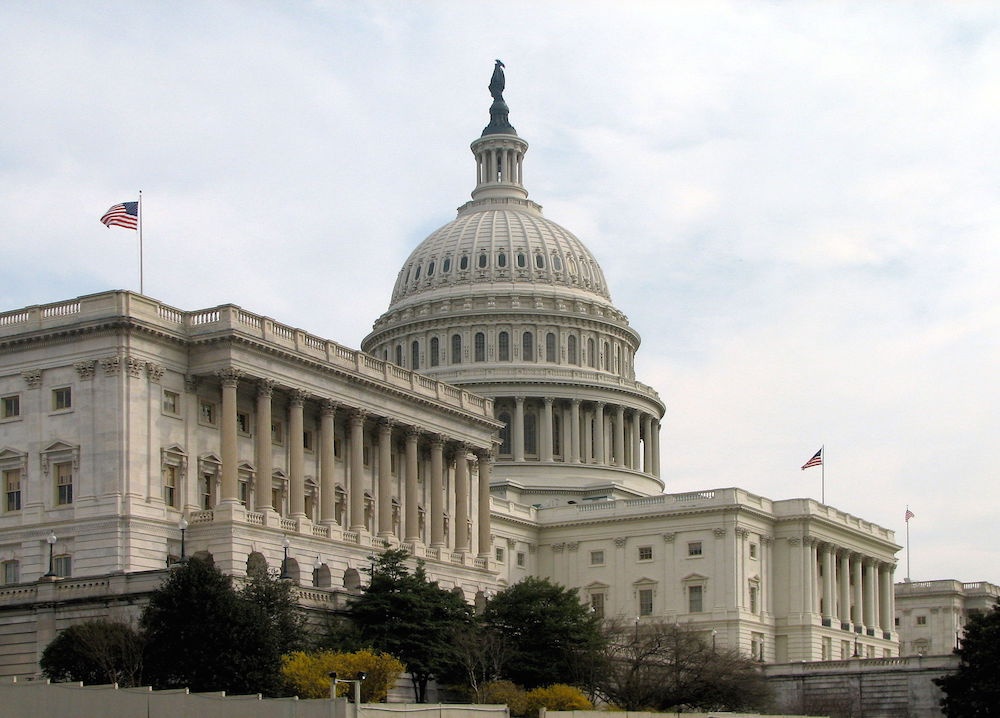Duke Energy invests in keeping a climate science-rejecting U.S. Senate

(Photo of the Senate side of the U.S. Capitol building by Scrumshus via Wikipedia.)
After the U.S. presidential contest, one of the most pressing political decisions facing voters this election year is which party will control the U.S. Senate.
Republicans took control of the upper chamber of Congress with a 54-46 majority in the 2014 midterm elections, but hanging on to that edge could prove difficult. For one thing, of the 34 seats up this year, 24 are now held by Republicans. In addition, some Republican Senate candidates aren't doing as well as expected in the polls, a possible effect of GOP presidential nominee Donald Trump's unpopularity.
But the nation's largest electric utility is investing heavily to help Republicans maintain Senate control.
North Carolina-based Duke Energy has made only three contributions to federal politics so far this election cycle, according to the Center for Responsive Politics' OpenSecrets.org database. In March, the company's political action committee contributed $1,500 to the campaign of U.S. House Speaker Paul Ryan, a Wisconsin Republican. Then in June, it contributed $3,000 to the Together Holding Our Majority PAC, a leadership PAC affiliated with U.S. Sen. Thom Tillis, a North Carolina Republican, which in turn has contributed to the campaigns of over a dozen GOP Senate candidates.
Duke Energy's biggest federal contribution by far — a hefty $150,000 — went to the Senate Leadership Fund, a super PAC focused on maintaining the chamber's Republican majority. Founded last year, the group is led by Steven Law, the former chief of staff for Senate Majority Leader Mitch McConnell of Kentucky. It works closely with American Crossroads, a conservative super PAC founded by former White House strategist Karl Rove. Duke Energy made the six-figure contribution on March 3.
Among the races the Senate Leadership Fund is focusing on is the increasingly tight contest in North Carolina between incumbent Republican U.S. Sen. Richard Burr and his challenger, attorney and former state House Majority Whip Deborah Ross of Raleigh. The super PAC — which refers to the Democratic challenger as "off her rocker Ross" — is attacking her for her former role as the head of the state chapter of the American Civil Liberties Union and blasting her for supporting abortion rights and taking action to remove a display of the Ten Commandments from a public space.
Why would Duke Energy be investing in a super PAC that's politicking on divisive social issues in its home state?
Looking at the other top contributors to the Senate Leadership Fund offers some clues. The California-based oil giant Chevron has contributed $2 million. Petrodome Energy, an oil and gas production company based in Houston, has kicked in $1 million. Devon Energy, an Oklahoma-based oil and gas exploration and production company, donated $750,000. Michael Smith, chairman and CEO of Freeport LNG, a liquid natural gas operation in Texas, contributed $500,000. NextEra Energy, a Florida company whose subsidiaries include Florida Power & Light, which gets most of its energy from natural gas, contributed $250,000.
That fossil-fuel interests would want to keep the U.S. Senate in Republican hands makes sense, as under GOP control the body has served as a bulwark not only against policies to curb carbon emissions but against even accepting the basic science of human-caused global warming.
While over half of all Republicans in Congress reject or question the scientific consensus that human activity is contributing to climate change, that figure is 70 percent for the Senate, according to a ThinkProgress analysis. Last year, for example, the Senate voted down a resolution tying climate change to human activity — even though that connection is accepted by the overwhelming majority of climate scientists.
Among those Senators who voted against acknowledging the science of human-caused climate change were Burr and Florida Republican Marco Rubio — both of whom are benefitting from Senate Leadership Fund efforts attacking their opponents who accept the science of global warming and who've called for action to curb climate-disrupting pollution.
Burr has said that has has "no clue" how much of climate change is attributable to human activity and that he doesn't "think that science can prove it." Ross, on the other hand, repeatedly voted to address climate change and promote cleaner energy sources during her time in the state legislature, and she has pledged to address the impacts of climate change while in the U.S. Senate.
Rubio has been direct in rejecting climate science: "I do not believe that human activity is causing these dramatic changes to our climate the way these scientists are portraying," he has said. He's running against U.S. Rep. Patrick Murphy, a Democrat who currently represents Florida's Republican-leaning 18th congressional district. Murphy accepts the scientific consensus on global warming and supports President Obama's Climate Action Plan, which calls for cutting carbon pollution from power plants and methane emissions from the oil and gas sector.
The need to take swift action to curb climate change is becoming increasingly urgent. Last month was the hottest July ever recorded in 136 years of record-keeping. It was also the 10th straight month of record-breaking temperatures, according to NASA, and the 379th consecutive month with temperatures above the 20th century average. The record warmth has been implicated in a number of recent disasters, including this month's record flooding in Louisiana.
Meanwhile, climate scientists are warning that the Earth is dangerously close to breaking the 1.5-degree Celsius upper limit for global warming set during last year's Paris climate talks. That target, measured in relation to pre-industrial temperatures, aims to avoid some of the worst impacts of climate change like deadly heatwaves and widespread flooding.
But if Duke Energy and other fossil-fuel interests get their way, anti-scientific thinking and climate policy inaction will likely remain business as usual in the U.S. Senate.
Tags
Sue Sturgis
Sue is the editorial director of Facing South and the Institute for Southern Studies.
